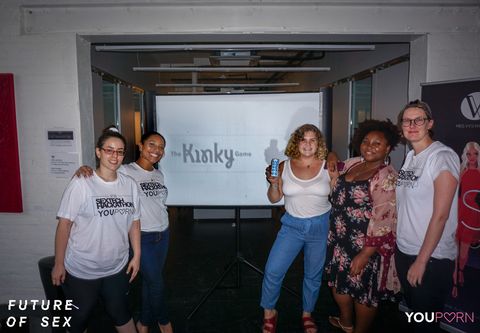
What will the future of sex look like? Will there be remote-controlled birth control? Or uber-smart sex toys capable of giving us orgasms within seconds? Or sex robots staffing brothels give us unimaginable amounts of pleasure? Hell, will human beings even want to keep having sex with each other in the first place?
These are the questions currently being addressed by thought leaders in the sex tech industry, a business devoted to revolutionizing the way we think about sex and intimacy. (Think Bluetooth-connected vibrators, smart sex dolls, and BJ-giving robots.)
The sex tech industry is estimated to be worth $30 billion, and that number is growing every year. To get more of a sense of what the future of the industry holds, I attended the SexTech Hackathon, an annual event sponsored by YouPorn and the sex tech intelligence platform The Future of Sex.
Billed as a Shark Tank-style event for budding sex tech entrepreneurs, the weekend-long event consisted of a “hackathon” that culminated in a Shark Tank-style event for budding sex tech entrepreneurs, who pitched their ideas for sex-oriented apps, startups, and platforms designed to disrupt the way we think about sex and intimacy. The winner gets $1,000 in prize money and a slow at the upcoming SexTech Accelerator, a program to help them turn their idea into a reality.
Curious about what the future of sex has in store for you? Here’s what we saw.

Carrie Weisman
1:05 p.m. The pitches kick off with a presentation from the team behind Porn Cinema Hub. Like Pornhub, Porn Cinema Hub would ostensibly be a web-based platform that hosts free streaming porn; unlike Pornhub, however, which pretty much hosts whatever content viewers want to upload, Porn Cinema Hub would exclusively host sex-positive, ethically curated adult content.
In itself, this is not a bad idea: porn is often accused of propagating unhealthy ideas about sex, and there is admittedly a ton of content on tube sites that’s a bit, well, gross. But Porn Cinema Hub doesn’t really have a clear standard for what constitute “ethical” and “unethical” porn. For instance, incest porn is one of the most popular genres in the game, but even though it’s fake, would it pass muster with the folks at Porn Cinema Hub?
The judges, however, are focused on a different issue with Porn Cinema Hub: how they’d make money. The answer? Advertising — not exactly a unique approach, as most porn platforms look to paid advertising for revenue. The conversation shifts to subscription plans and premium content before one of the organizers politely tells the team their time is up.

Future of Sex/YouPorn
1:10: The next team members head up to the floor. They call themselves The Kinky Club, and they pitch a game intended to help improve couples’ sex lives by getting them to do dirty stuff they wouldn’t otherwise consider, like using blindfolds or hot wax. I get it — lots of couples are freaked out by sexual experimentation, and offering some guided suggestions might help get the ball rolling.
Still, there are tons of sex games and apps on the market, so I don’t know how many people would actually pay for this kind of thing. Besides, you can find these kinds of tips all over the Internet (which seems like the first place a couple would go when trying to find tips to spice up their sex lives to begin with).
1:20: We meet the team behind Socratex, an interactive web platform (fancy hacker and programmer code for a “website”) that offers comprehensive, sex-positive sex education to high school students. The judges are super into this idea, because inadequate sex ed is a real issue in this country: many states still only teach abstinence only, even though there is substantial evidence to suggest that it doesn’t actually stopping teens from having sex. Plus, Socratex wants to introduce new language concerning consent, intimacy, and respect, which even the most comprehensive sex education curricula don’t really touch on.
“One of the judges asks what everyone in the audience is thinking: ‘Does it smell?’”
1:30: Three polished-looking women come onstage. They’re the team behind Harvest, which claims to have developed a revolutionary method of using the leftover menstrual blood from a woman’s monthly cycle as fertilizer for houseplants. They refer to this as “menstrual surplus,” a term that I immediately vow to start using in regular conversation.
All kidding aside, I do have to give Harvest props for turning out the only tangible innovation in the bunch: a prototype that looks more or less like a normal flower pot, except with an added compartment at the base for the “fertilizer” to be distributed.
Surprisingly, the judges are into it, until one of them asks what everyone in the audience is thinking: “Does it smell?” (Apparently, the answer is no: the prototype includes a vacuum seal to lock in any odor. Smart!)
“One of the judges asks what everyone in the audience is thinking: ‘Does it smell?’”
2:31: After an hour-long break, a statuesque woman in the audience gets up to start her PowerPoint presentation for Deepthots. Deepthots, she says, is a paid dating platform that’s like Uber for sex workers, except instead of seeing ratings for drivers and passengers, users can see ratings for sex workers and clients. This would ostensibly make it safer for sex workers in the wake of SESTA-FOSTA, a controversial new law that has made it more difficult for sex workers to advertise their services online.

Carrie Weisman
The judges are big fans of the idea, but there’s one obvious sticking point: because prostitution is still illegal in most parts of the country, investors will likely be hesitant to pour money into a platform connecting sex workers to clients. Nonetheless, Deepthots gets credit for having the best tagline of the bunch: “If we build it, they will cum.”
2:45: A slight, nerdy-looking guy named Peter walks up to the floor to pitch his idea: a program that simulates blowjobs through augmented reality (AR) tech. Peter nervously explains that augmented reality adds computer-generated details to users’ experience of the physical world. (Remember Pokemon Go? Yeah, it’s like that.)
To demonstrate what he means, Peter pulls out a phallic-looking piece of paper. A computer-generated blowjob queen shows up on screen, and she starts going to town on the dick-shaped paper, performing what looked like grade-A, head-bobbing, deep-throating oral love on this thing. The crowd goes wild. It’s such a solid pitch that the judges barely ask Peter any questions.

Future of Sex/YouPorn
2:50: The last team, Threads, goes up to present its pitch. Threads is basically a sexting app designed to help long-distance couples by allowing them co-author erotic stories together. It provides different scripts for different settings, and it seems like a pretty practical tool: for many couples, talking dirty can be awkward as hell, so going off someone else’s script seems like a safer approach. That said…do we really need an app to tell us how to sext? IDK.
3:00: The judges break for deliberation. Everyone rushes to grab whatever wine is left.
3:30: The judges return. Socratex, the sex ed platform, is declared the winner. They take home $1,000 in prize money, but more importantly, they are headed to the SexTech Accelerator: a program designed to polish their pitch and incorporate it into the global market. Threads comes in second, and Harvest, the menstrual blood harvesting tool, takes third place.
So if the results of the SexTech Hackathon is to be trusted, the future of sex tech involves more comprehensive sex education, apps that help you become a better sexter, and more creative uses for menstrual blood. And while that’s far from the erotic future most of us have envisioned of sexy smart sex robots and orgasm machines, hey — it’s a start.
Source: Read Full Article